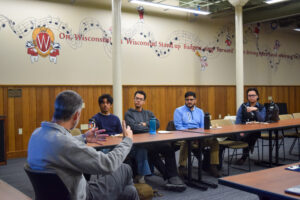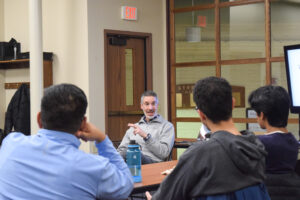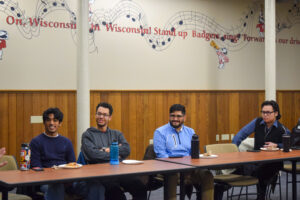This spring, with guidance from School of Journalism and Mass Communication teaching faculty Adam Schrager, UW–Madison Posse scholars took part in a storytelling workshop designed to help them share their lived experiences with clarity and confidence. The event highlighted the SJMC’s growing investment in partnerships that center student voices and expand the reach of journalism education across campus.

Posse identifies high school students in various major U.S. cities with extraordinary academic and leadership potential. The program extends these students the opportunity to pursue personal and academic excellence by awarding them full-tuition leadership scholarships and placing them in supportive teams – “Posses” – of 10 students. Posse’s primary goal is to train diverse leaders of tomorrow who can serve as catalysts for change.
The one-hour conversational workshop served as an opportunity for Posse scholars to reflect on their journeys and gain tools to craft compelling narratives to tell their Posse story confidently and intentionally while also providing students one-on-one time with a faculty member. Schrager broke down the basics of a good story and emphasized the importance of their personal stories and that the best person to tell their story was themselves.
“One of the things professor Schrager talked about was that everyone has an interesting story to tell, it’s just about finding the right way to tell it and to the proper audience,” said Julien Payen, a sophomore Posse scholar and SJMC student. “The stories that he showed us during the presentation were captivating, and they helped me gain an appreciation for things that we might think are average or normal, but are incredibly interesting to a different audience.”
Former Posse academic advisor and current SJMC undergraduate academic advisor Lauren Anderson was thrilled to collaborate with the SJMC and provide her students an opportunity to practice sharing their stories in a friendly, relaxed environment.
 “I hope that the workshop encouraged pride in literally everything they’ve done at such a young age, especially if folks have experienced imposter syndrome in academic spaces, around Madison or in professional settings,” Anderson said. “All of them are making a really big mark on campus in their own ways and it’s important that they know that there are ways to communicate those things and what they stand for in a way that doesn’t feel like bragging.”
“I hope that the workshop encouraged pride in literally everything they’ve done at such a young age, especially if folks have experienced imposter syndrome in academic spaces, around Madison or in professional settings,” Anderson said. “All of them are making a really big mark on campus in their own ways and it’s important that they know that there are ways to communicate those things and what they stand for in a way that doesn’t feel like bragging.”
As an auxiliary program on campus, Posse depends on partnerships with other departments and organizations at UW to provide quality programming to its students and expose them to various areas of opportunity. SJMC has taken a proactive approach in partnering with a wide range of programs at UW to increase awareness of the school and its degree paths and certificates.
 “It was great to feel like someone’s coming to us. I think that really speaks to the school overall and its faculty and staff,” Anderson said. “I hope that this can continue in the future and hopefully each event will just get better and better with each iteration.”
“It was great to feel like someone’s coming to us. I think that really speaks to the school overall and its faculty and staff,” Anderson said. “I hope that this can continue in the future and hopefully each event will just get better and better with each iteration.”
For Schrager, his goal for the workshop was simple: show students why story matters.
“Everybody needs stories. At its core, this is why the skills we teach in the department work in every building on this campus. Every single one of them needs storytellers,” Schrager said. “Hopefully, this workshop gave them an opportunity to understand why story matters and how it can help them going forward.”
With so many options available to students at UW, it is more vital than ever that the SJMC actively work with campus partners to both raise awareness of the School and continue its mission of inclusive excellence. This workshop, the first of its kind for the SJMC, is a launching pad for future events with Posse and other programs at UW.
“I’m a big believer in telling stories through the voices of people who oftentimes are not able to share their stories. The Posse program is designed on this campus to ensure there is representation from certain groups that historically have not necessarily been seen in society and at this university,” Schrager said. “To the extent that we can see them and honor them and be empathetic and empower them, that’s a night worth spending. I hope to continue that with other organizations as well.”